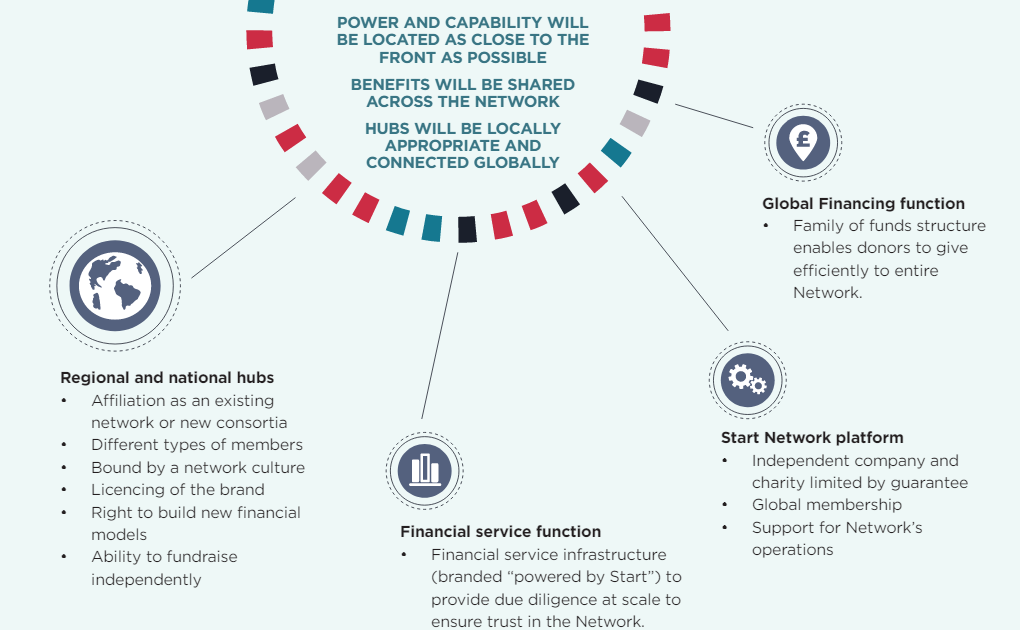The Start Network’s vision is to become a decentralised network of hubs at the regional and national level – autonomous but interconnected, sharing knowledge, innovations and resources, facilitated by a global platform. This vision is becoming a reality in places such as Bangladesh, where we have the first national Start Fund, and in Pakistan where members are coming together on a “Realisation Team” to explore the setup of a Start Network hub.
To discover the value of hubs in other places, Start Network’s Neil Townsend and Bhavya Srinivasan set off to Jordan and Kenya to find out.
Consultation meetings took place for members in Amman and Nairobi as part of Start Evolves, a process to co-design the future of the Start Network.
The meetings engaged regional and local staff – from agencies such as Action Aid, Muslim Aid, Handicap International, International Rescue Committee, ARDD Legal Aid, Caritas Jordan and others - and gave them a chance to discuss some of the key propositions in Start’s vision and how those elements could be applied in Jordan and Kenya and the surrounding regions.
Nairobi, Kenya
In Kenya many people felt that a Start Network hub could add most value at the regional level, given that crises here typically aren’t limited to single countries. Although there are already coordination mechanisms operating regionally, it was recognised that the aims of Start Network in changing the ‘humanitarian economy’ are typically not addressed in any other forum either regionally and nationally.
Furthermore, participants highlighted that locally and nationally headquartered organisations struggle to access existing contingency funds; and that enabling these organisations to access funds directly would be an important feature of any new fund.
Much of the discussion focussed on the potential identity of any Start or Start-affiliated hub. Many participants were supportive of the affiliation model in which a locally based network, such as NEAR Network, could affiliate with Start, as opposed to the emergence of a new hub initiated by Start. There was wide recognition that a locally based network would have excellent context specific expertise.
Some concern was raised about whether a hub would have to carry the Start brand – although it was also acknowledged that some degree of joint branding could build profile with donors and potentially make it easier to access funding collaboratively.
Participants also were open to the prospect of extending membership to the private sector, which could bring a useful diversity of skills and experience, as long as the potential member had values that aligned with those of the network.
The meeting concluded with energy and appetite to further explore what this future Start model in Kenya could look like in practice. Participants proposed that a more detailed local consultation process would be an important and welcome next step.
Amman, Jordan
In Jordan there was a sense that a Start hub would have an amplifying and unifying effect on the country’s humanitarian community. Participants felt it could help bring together the existing INGO and national NGO forums, which currently operate independently. They were interested to see how the Start Evolves process could help local organisations have a seat at the table with institutional donors and further the localisation agenda.
“This was a good start for better understanding the Start Network mandate in the region, and how we can interact as members at a national level to facilitate the establishment of a hub in the future”. Samar Muhareb, Director, ARDD Legal Aid
There was also a sense that the NGO community is currently excluded from many of the important policy level meetings that are ongoing in Jordan. And so participants were hopeful that the Start Network, or a Start hub, could help the NGO community leverage and maybe even influence the sector and how programmes are designed and delivered.
There was interest around the practicalities of setting up a hub, and of the Start Evolves process in general. Questions ranged from what the membership capacity would be at the hub-level, to how the overall process would be funded, and what has been the experience from other country engagements. There were also broader questions specific to Jordan about possibilities of looking into country-specific funding mechanisms and thinking about a wider response to the protracted Syrian crisis.
One indisputable highlight of this experience for everyone involved was that this was the first time that Start Network members in Jordan convened with the shared, unifying purpose of transforming the humanitarian sector for the better, this inspired hope.

